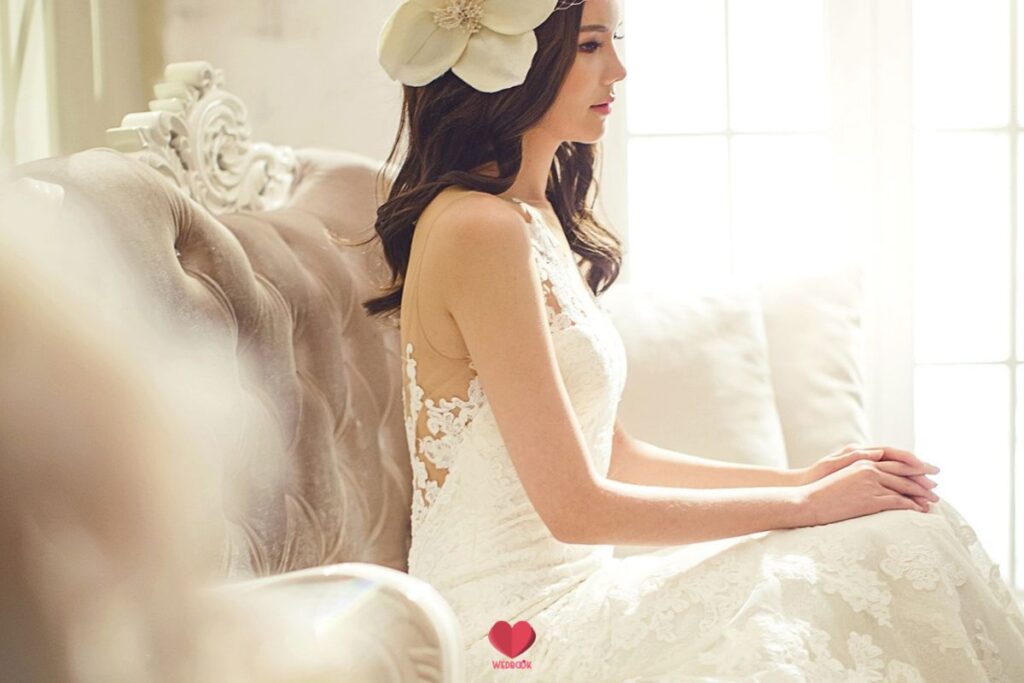Ask any bride or groom how they’re feeling on the days leading up to their wedding day or on the day of the wedding itself, and their common response will be excited & nervous. Wedding anxiety, before the wedding, on the wedding day, or after the wedding sometimes is common and nothing to feel worried about. Wedding planning is a task in itself, add on that, the pressure to look your best, keep up with the family’s expectations, want everything to go well, and keep your relationship problems to the minimum. It’s hard to not feel overwhelmed. So, it’s okay. And it will be okay. Find below practical tips to deal with wedding anxiety, overcome wedding anxiety, and feel happier and calmer on one of the best days of your life.
Pre-Wedding Anxiety
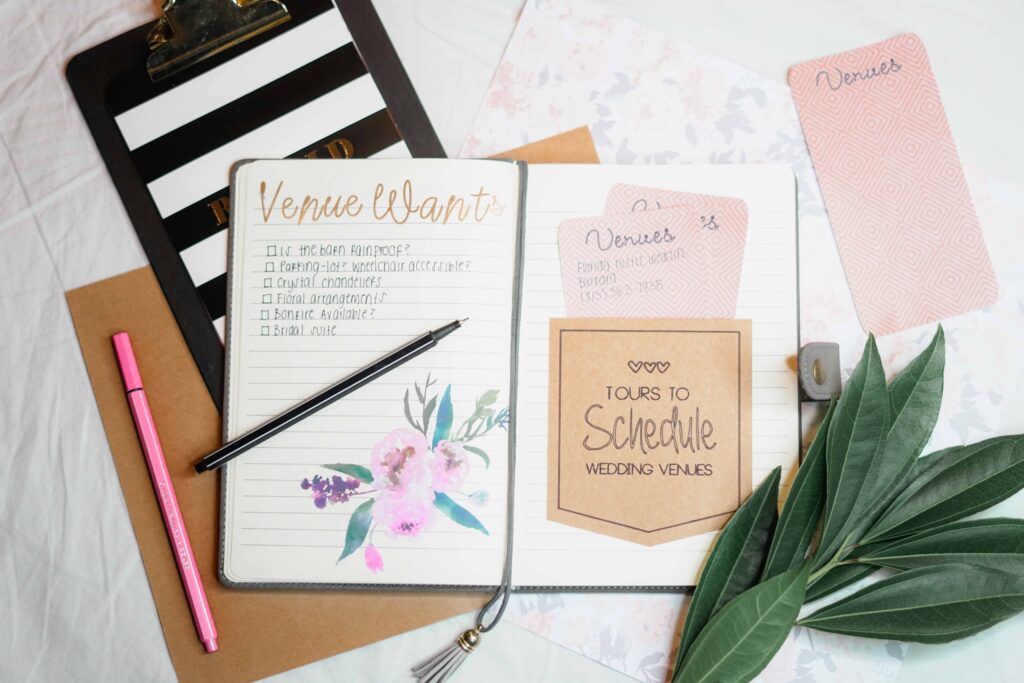
Pre-wedding anxiety can hit you at any time. For some, it starts when they start printing their invites, some have wedding anxiety after buying a wedding dress, and some experience it in the month leading up to the wedding. No matter when you experience anxiety before a wedding, there are some surefire ways to help overcome wedding anxiety and make your wedding planning & the wedding day happier and calmer. Here are seven tips to help you with wedding anxiety.
#1 Build A Support Team
The biggest mistake you can make while planning your wedding is to do everything yourself and not delegate more. Brides often tend to fall into the trap of perfection and think others won’t be able to do things with as much accuracy as they do. After all, it’s their wedding day, not theirs. And you’re right. It is your wedding day. But you aren’t overwhelming anyone with tons of responsibilities. Anyone would be happy to help with an aspect of your wedding planning. Plus, if they care about you, they’d make it as perfect as you’d want them to be.
Vendors:
There’s nothing that will ease your pre-wedding anxiety quite like having the right team of professionals. Hiring people who understand your vision and are able to talk you through your stressors will do wonders to calm your nerves. Picking professionals is the first step of wedding planning and is very important – dedicate a good amount of time to this task, and start early because the best in the field get booked up really fast.
Friends & Family:
Have a group of supportive friends and family around you. Give them some tasks to handle at your wedding so you can stop worrying about them. These can be very small, menial tasks – something they can do easily. Like asking your chatty friend to make small talk with guests or letting one of your bridesmaids handle the due payments at the end of the day or someone coordinating with your HMUA to reach on time, etc. Make a list of these small tasks and find a member in your close-knit group who can handle them the best.
Fiancee:
There’s a notion that men aren’t interested in wedding planning. Well, some aren’t. But about 2 in 3 men said they were as excited to plan a wedding as their bride-to-be’s, research concluded and published in NY Post stated. Even if your fiance doesn’t seem that involved, there will be some aspects of planning that he will find exciting. Find those elements and let him handle those things. This can be anything – venue hunting, cake tasting, bar arrangements, reception menu, and the one part all men will be excited about – your honeymoon.
#2 Practice Mindfulness & Meditation
Meditation and mindfulness aren’t just sweeping the Internet for no reason, they can have a massive effect on your mental health. While each one has a benefit of its own, they work better hand-in-hand. Meditation is a practice where you sit for a few minutes, focus on your breath, and just watch your thoughts go by without judging them. While that’s the basic form of meditation, many people prefer other types of meditation practices like transcendental, loving-kindness, mantra meditation, or visualization-based meditation also called guided meditation. Mindfulness, on the other hand, involves being present at the moment and being fully aware of where you are and what you’re doing. Whenever your mind wanders off, you bring it back to the present moment. Some people practice focusing on the breath to achieve mindfulness in their everyday life.
Regular meditation and mindfulness help boost your concentration, and awareness, and make you less reactive to situations. There’s an ever-growing body of research that suggests these practices can have a significant positive effect on an individual’s mental health and reduce the thoughts of depression and anxiety considerably. Long-term meditation and mindfulness practice also increases your resilience to stress, increase your compassion, and breaks negative thought cycles. If you aren’t quite sure about where to start, there are some amazing apps like Headspace and Calm to help you start. The earlier you start, the better you’d be able to handle your wedding anxiety and considerably reduce your chances of wedding day anxiety and post-wedding anxiety.
#3 Have A Sound Sleeping Schedule
Anxiety can rob you of a good night’s sleep and less sleep can trigger your anxiety. It’s a negative spiral you certainly don’t want especially at a time when beauty sleep is of utmost importance. Think of it like having coffee not letting you sleep at night so you feel drowsy the next day and you have more coffee to stay awake in the day only to compromise with a good night’s sleep again. Following sleep hygiene can help with wedding anxiety. Here are some steps to take:
- Avoid gadgets at least 2 hours before bed.
- Follow a relaxing sleep routine, which can include taking a bath, reading something light, journaling, meditation, listening to some calm music, etc. You can also do a guided meditation as you sleep to relax your mind as you doze off.
- Keep naps short – around half-an-hor to an hour.
- Don’t take caffeine after 1 PM or skip it entirely if you’re quite sensitive to caffeine.
- Don’t have any fluids closer to half an hour before bedtime.
- Keep your bedroom quiet, dark, and cool.
- Try to soak in the Sun early in the morning for around 30 minutes or so to balance your Circadian rhythm.
#4 Acknowledge, Reframe, & Manage Your Thoughts & Feelings

How often has a situation build-up in your mind much worse than how it actually went? Many, right? And quite many if you’re already someone who is an anxious person who overthinks every situation. The same can happen with a wedding scenario. What if the caterer doesn’t make as amazing food as they did during the tasting? What if my bridesmaids don’t look coordinated? What if my sister’s toast becomes longer and everyone gets bored? What if, what if, what if!!
However, downplaying these feelings isn’t the right way to approach them. The right way is to accept how you’re feeling and reframe these thoughts. When these negative thought spirals present to you – start by noticing them and if possible, write them down. Writing is a great way to sort through your feelings and thoughts in times of anxiety and stress. Once you have them sorted, question if these thoughts are grounded in reality or are unnecessarily predicting the future which hasn’t even happened yet.
People often think reframing your thoughts is about positive thinking when it really is all about finding the reality in a situation and finding meaning rather than finding the bright side. For example when you’re thinking, what if the caterer doesn’t serve as delicious food as he did during the tasting do you have any basis for this thought? Have the caterers changed their cooks? Or have they mentioned any changes in your wedding contract? Oftentimes, there’s no logical reason for these thoughts and this is when reframing helps. It helps you face your anxious thoughts and turn them into calmer, logical ones so your raging mind doesn’t get the worse of you.
#5 Get Professional Help
Never be afraid of seeking professional help in times like these. In our opinion, expert help can work better and quicker for you than any other strategies on the list. They can work with you through a number of therapies like CBT (quite popular at the moment for anxiety) that involves understanding your thought pattern that is causing anxiety and changing them, psychotherapy, and guided meditations. Besides these methods, you can also seek hypnotherapy in which hypnosis is used to create a state of focused attention via verbal cues, imagery, and repetition. It’s very important to choose a trusted professional for hypnosis. Some patients experience betterment in their everyday routine with just one to two sessions of hypnotherapy.
You can also try integrative medicine therapies like the popular energy-healing technique Reiki. This Japanese form of energy healing is based on a pseudo-scientific premise that the human body has energy centers (chakras) that needs to have space so the energy can flow freely through the body. This healthy energy flow keeps us balanced and promotes physical, mental, and spiritual health. In the process of energy healing therapy, an expert uses their hands to remove any blockages in your chakras and you feel lighter in the head and more relaxed immediately, just what you need for wedding anxiety.
#6 Eat Well & Exercise Well
If you have been experiencing anxiety before the wedding or anxiety after the wedding or anxiety any other time of your life, it’s important that you exercise and eat well. It also furthers your goal of looking your best on your wedding day. Research suggests that 30-minutes of moderate to high-intensity workouts three to five days a week is enough to reduce symptoms of anxiety, depression, and negative mood. Everything from aerobic exercise (one study suggested that even a single bout of 30-minute aerobic exercise showed a reduction in anxiety symptoms) to HIIT to yoga and a brisk walk in nature is shown to improve psychological function and hence, help ease the wedding anxiety symptoms. Thus, one of the best things you can do to calm your wedding planning anxiety is to have a sustainable exercise schedule.
Couple your sustainable workout routine with a healthy diet. Follow the 80-20 rule where you have 80% healthy food and 20% can be less healthy or junk food. Eating healthy not only benefits you physically – but there’s a mental connection as well. Why? Because your intestine has a “second brain” called the enteric nervous system. Though, it’s the main job is digestion and absorption of nutrients, it constantly communicates with our central nervous system (brain and spinal cord). Scientists are just recently discovering how the health of our intestine (a.k.a the gut flora) impacts our mood and why a higher-than-normal percentage of people with IBS or other digestive issues suffer from depression and anxiety.
That being said..the health of your intestine depends greatly on what you eat. Nourishing, whole foods like whole grains, legumes, fresh fruits & vegetables, and nuts can have huge mental benefits. We understand that juggling wedding planning with your daily life gives you little time to have healthy food. Our solution: plan your meals and have healthy snacks ready every time! And also, replace your caffeine with calming herbal teas like chamomile or lemon balm. Do this for a week and you’ll experience a change in your mental state as well.
#7 Be Realistic With Your Expectations
You need to be grounded in your expectations. You can’t expect your wedding florist to bring you the best of flowers if you don’t have the budget to pay them accordingly. And that Pinterest hairstyle might not look as dreamy in RL as in pictures. Any expectations you have from your vendors should be clearly stated before you sign a contract with them. Also, stop comparing your wedding with others. Comparison is the thief of joy. Stay true to what you believe your happy day should be like. And also faze out any family or friends who are raving about the amazing vanilla cake at a wedding they recently attended when you have selected (and wanted) a red velvet flavored cake. Just tune them out or change the subject.
Similarly, you can’t ever be sure of how your close family behaves on the wedding day. If you have any expectations of them and you rightfully can have them, talk to them before the wedding itself. Know that there are difficult members in all family systems, and sometimes acceptance is the best way forward because conversation just makes things trickier. For those difficult family members, have someone trustworthy, preferably a sibling, to handle them.
Wedding Anxiety On The Big Day!
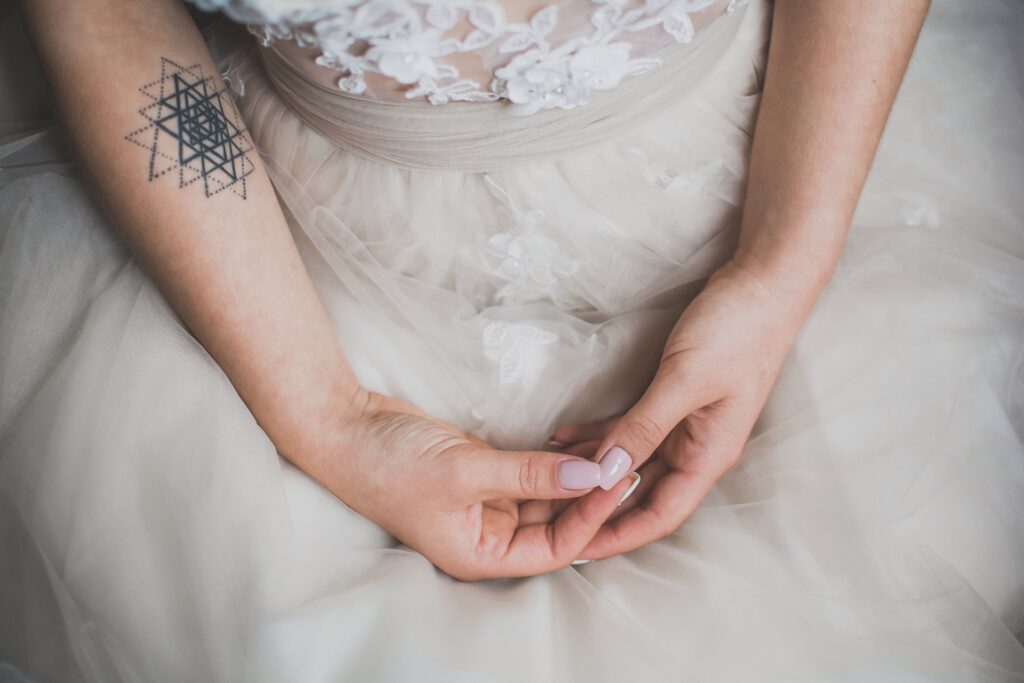
The big day is here! The big day. The BIG DAY! If the very thought of the day doesn’t cause some level of nervousness in your bones, we aren’t sure you’re even human. The very thought of waking up on the day of your wedding and realizing it’s the day of your wedding can be nerve-wracking in one moment and exciting in another. These mixed feelings are completely normal. Even celebrities have had them. From Priyanka Chopra to Britney Spears, everyone has confessed to having a panic attack on their wedding day. Some wedding anxiety symptoms include an overwhelming fear or dread, gurgling in the stomach, restlessness, shortness of breath, and racing thoughts. If you’re having these symptoms, here are some ways to deal with wedding anxiety.
How To Overcome Wedding Day Anxiety?
#1 Have A Sound Sleep On The Day Prior
To calm your wedding anxiety, we’d recommend getting a sound sleep more than anything else. We know anxiety can hamper your sleep cycle, but if you won’t have a good night’s sleep, there are chances you will wake up in a grumpier mood not to forget how beauty sleep is important to look your best ahead of the wedding day. We aren’t scaring you, we have a plan to help you. To help you sleep better and ease your anxiety, we have some actionable steps to try on the night before your wedding. Starting with avoiding your phone or any other gadgets for the 2 hours before you go to sleep. Ideally, you should go to bed by 11 PM. But even if your schedule permits you to go to bed at 12, stay away from your phone for around 2 to 3 hours before you have to sleep. Try to get at least 7 hours of sleep (minimum 6).
Indulge in some relaxing activities. You can draw a calming bath (try a calming bath salt here), do some self-massage or listen to some relaxing music. Dim the lights of the room and create a quiet, soothing atmosphere. You can meditate at this time as it helps to quieten the mind by noticing and letting go of the thoughts. You can also try journaling to calm your mind. Try not to speak to anyone – your SO included – closer to when you want to go to bed. If you don’t feel as sleepy yet or worried about the racing thoughts raging again when you hit the sack, we recommend listening to white noise or any other music like rain, piano music, etc. You can also choose a sleeping meditation
to help you fall asleep faster & better.
#2 Keep Your Support Circle Close
One of the best things you can do on the morning of your wedding is to spend time with your close family and friends. They can be anyone from your mother to your aunt to your sister or your wedding party. We’d recommend having people who’re empathetic and good listeners if you’re looking to vent out about the pressure and wedding anxiety building up inside you. Empathetic people are amazing at understanding and replicating other people’s emotions and taking them into due consideration without judging. You’d know who these people are and you’d need them at this time. And don’t worry about the pressure of being the happy bride on your wedding day. You can be open and vulnerable in front of your support group – they’re there for you, no matter what.
Even if you chose not to talk about the anxiety and stress, having people who are helpful, understanding, and only want the best for you is certainly calming. Alternatively, you can also choose to have some fun at the wedding party in the morning. Sometimes talking doesn’t help with the wedding anxiety, a fun banter or laughing does the job better. A cheery time with your nearest & dearest puts you in a positive mood at the very start of the day, eases the stress, and will help you stay in the moment without becoming the prisoner of your anxious thoughts.
#3 Don’t Skip Breakfast
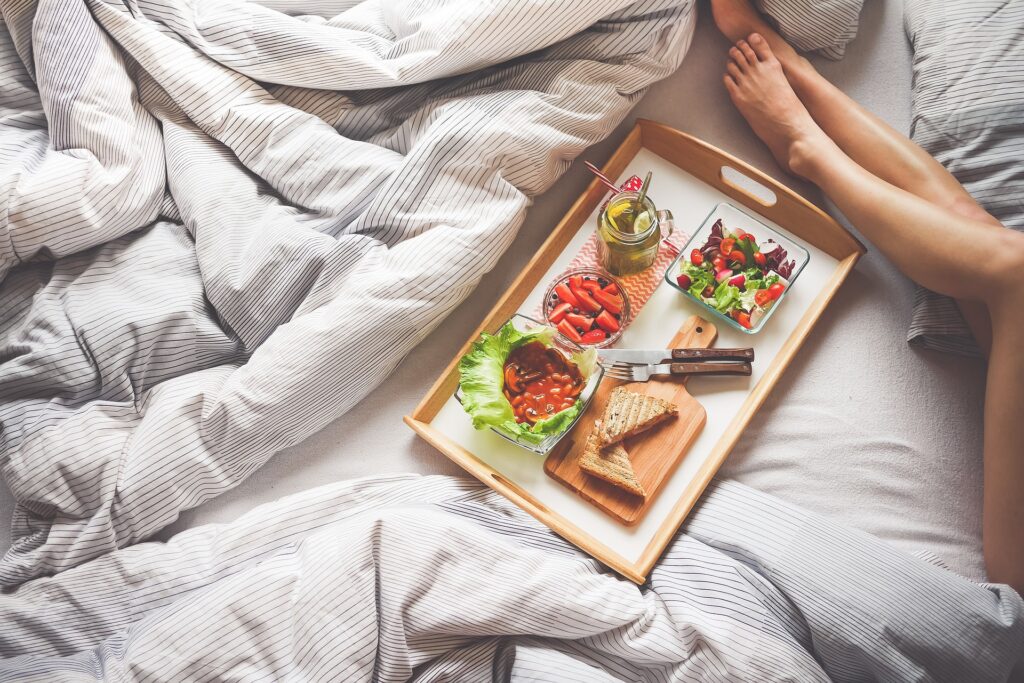
It sounds simple, but it helps. And also, the gut-brain connection is real. Don’t skip breakfast on the morning of your wedding. You can have something simple like your favorite pancakes (made with whole grains, not refined flour), granola, or a big jar of smoothie filled with nuts and oatmeal, etc. Assign a bridesmaid to do this for you if you don’t have time in the morning. Better, ask the hotel authorities to get your meal early in the day so you have one less thing to worry about on the wedding day. Pick something healthy and filling, you’d need it to get through this emotionally and physically draining day.
As much as you’d want to have your morning cup of joe, avoid it if your wedding anxiety symptoms have manifested physically and you’re experiencing shaking hands and rumbling in the stomach. At this time, herbal tea like ginger, peppermint, and lemon balm will particularly help. Also, if your anxiety is causing indigestion symptoms like nausea or acidity, we’d recommend adding low-acidity foods in the morning like whole-grain toast, oatmeal, and fresh fruits – although skip citrus fruits like oranges or limes in your wedding day breakfast.
#4 Focus On Your Partner
When those small details go wrong, remember why you’re doing this – to get married to the love of your life and start a beautiful journey with him. There’s a quote we love that says, “Make your marriage more awesome than your wedding.” Your wedding is happening because you want to spend the rest of your life with your partner, so focus on the bigger picture, because in the end, that’s all that matters. If talking to him will make you feel better, just arrange a call. Or meet him. Get in a quick half-an-hour breakfast date before the day starts. He might love the surprise too because he can be experiencing the same pre-wedding jitters at the moment. No need to panic, it’s normal for both bride & groom to experience it.
If you also have social and wedding anxiety because you will be at the center of attention, then as you walk down the aisle, only & only look at the groom and look into his eyes and forget anyone else is there. This is a great way to remember the love & happiness you’re feeling at the moment and make other non-helpful emotions subside. You can also make similar eye contact with other people you love, like your mother or your father when you reach the end of the aisle. You don’t say anything, just smile and let your heart convey the message.
#5 Use Coping Strategies
Practice coping strategies like journaling, meditation, and visualization to handle the anxiety and keep it manageable. Take around 15 to 30 minutes to practice them. You can also take time out to exercise. Exercising is scientifically proven to reduce stress and anxiety – no matter which kind you choose – it can be anything from a short walk or a vigorous 15-minute run or HIIT or grounding Yoga practice. Exercise is known to release endorphins, the feel-good chemicals, and has a dramatic anti-depressive effect, blunting the brain’s response to physical and emotional stress. One study proved that exercising for as little as 15 minutes can quieten anxious brain activity.
Similarly, other coping strategies can help as well. You don’t necessarily have to do all of them, just pick the ones that work best for you. Or do some – like journaling or visualization the day prior at night and the rest in the morning. It’s also said that it’s best to do visualization exercises right before you go to sleep after you meditate for a few minutes. The last two minutes of when you fall asleep stay in your mind for up to 4 hours in your subconscious mind. If you have wedding anxiety for the center of attention, visualize yourself confident and happy walking down the aisle. Visualize every little detail as much as you can – from the color of your nails to the boutonniere your groom would be wearing as you walk towards him. Remember, feel the emotion – that’s the most important aspect of successful visualization practice.
#6 Plan Ahead
If you know there are some aspects of the wedding day that are bound to give you anxiety, plan ahead for them. Worried about a longer father-daughter dance? Shorten it. Usually, it’s around three to five minutes long, but you can shorten it to around 2 minutes or so. Terrified of a big entrance? Skip a big entrance or exit at the reception, and make a shorter aisle so you don’t have to be at the center of attention for a longer time. The key to remember is to not take someone else’s opinion influence your decisions when you know very well that these aspects can worsen your anxiety.
Further, make the most of your rehearsal day. The purpose of a rehearsal is to make sure everything runs smoothly on the wedding day, as per the timeline you have created. It’s a great time to gain some confidence and familiarity with how the actual day will go – so some amount of anticipatory anxiety is appeased. On the wedding day itself, schedule some short breaks. Use your timeline as an excuse to take those moments alone. Don’t worry about what your guests will think if you aren’t there for a few minutes – they understand weddings run on strict timelines. Take five to ten deep breaths, close your eyes and appreciate the magic of the day before going out again.
Post Wedding Anxiety
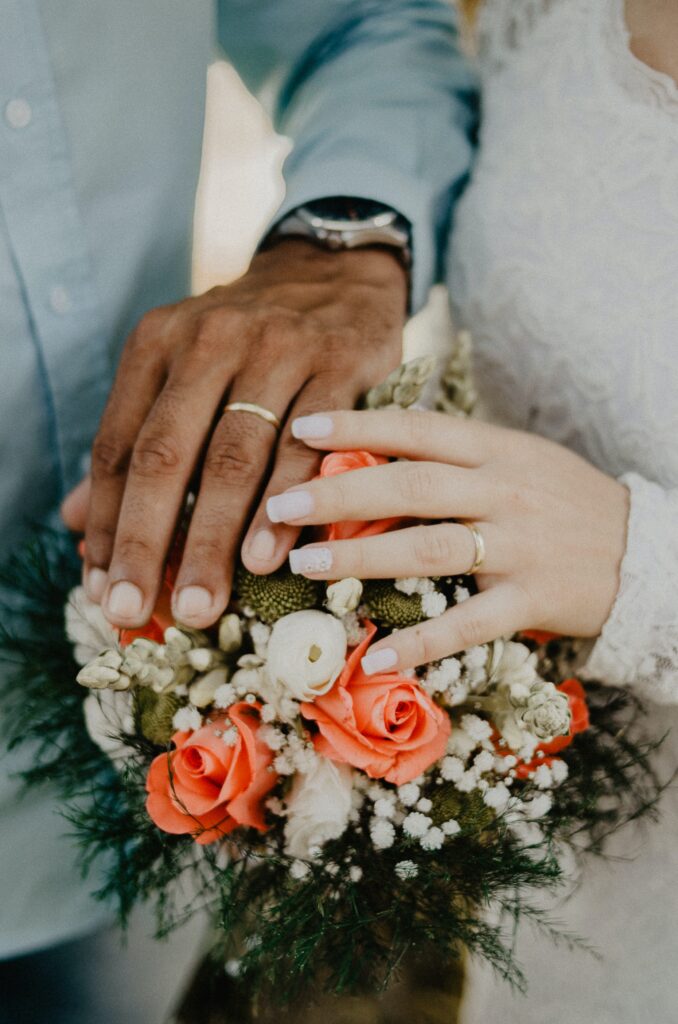
For some lucky couples, the pre-wedding jitters just never come in. They’re surrounded by helpful family and friends who help them through every step of wedding planning. That doesn’t mean things don’t go wrong for them on the actual day itself. They can. But the emotional and mental pressure is assuaged by the support. Although, sometimes, these couples can experience what’s called post-wedding anxiety. Not just them, individuals who experienced pre-wedding anxiety or wedding anxiety can also experience post-wedding anxiety.
You might not have heard of post-wedding anxiety, but as you go through it and in turn, search for some help online, you will realize you’re not alone. That itself can be assurance enough to feel better that there are other recent brides and grooms who go through anxiety after weddings. It can hit them at different times though. Some feel it right after the wedding, others a few days after when the post-wedding high wipes down, and certain others don’t feel it until they come after their honeymoon, see their wedding pictures, and suddenly it all hits at once. No matter when you experience this, there are ways to cope up with post-wedding anxiety and we’re including some actionable steps below.
Common Reasons For Post Wedding Anxiety
- Fixating on details that went wrong
- Thinking your guests didn’t enjoy the wedding
- Deliberating on your bridal look
- Sad that it’s all over
- A feeling of emptiness or loss of purpose because there’s a sudden decrease in things to do after the wedding
How To Overcome Post-Wedding Anxiety?
Before moving towards the solution, find out the problem. Understand where the anxiety is stemming from. And most importantly, know that you’re not alone. You will see many stories on Reddit where the brides are narrating their experience of post-wedding anxiety, and most commonly, it’s stemming from the same thought process – some details didn’t go as planned on their wedding day.
One bride said that the weather on her wedding day changed suddenly, so they had to use tents for their outdoor wedding. It was cold and she could see guests getting a bit uncomfortable as the heaters were only working for those who were just standing near them. There were other hiccups as well like the father-daughter dance where they forgot most steps or the shutter bus driver getting lost. But there were things that went amazingly well like her envisioned bridal look and the delicious food for which she received tons of compliments. Plus, she received amazing photographs from the ceremony. Still, she ends up thinking most about things that went wrong and has anxiety. In the comments, you can see multiple brides talking about the same thing. They find it hard to wrap their heads around the idea of the things that went wrong and how guests might have noticed them more than the things that went right, and talk about how horrible the wedding was later.
Many brides also gave some helpful advice in the comments, which I think are some great ways to tackle this type of post-wedding anxiety. One bride suggested talking about these small details to some of the guests and they’d probably be like, “oh! That went wrong. I don’t even remember, I had a great time.” This will validate how things you were upset about most of your guests didn’t even notice and had a great time. Or, just let time take care of it. You will think about them for a while, but in a few months, you will forget these minute details as well. Also, try to remember any such details from a recent wedding you attended. You probably can’t think of any, unless it’s something really big, like a physical fight or if someone needed medical attention.
Trusting a therapist, journaling, meditation, and talking to your partner are other things to lean on during post-wedding anxiety. You can also talk to your friends who’ve been married and are comfortable sharing their emotional struggles. Another helpful strategy is to focus on what the wedding was all about – marriage. Our culture and society promote a perfect wedding so much that we seldom talk about what it takes to promote a healthy marital bond. As you come down from the highs of the wedding, it’s a good idea to spend some time with your husband and explore the everyday bliss of married life. Lastly, remember that anxiety doesn’t define you – and it doesn’t define your wedding day either.
Wedding Anxiety Groom
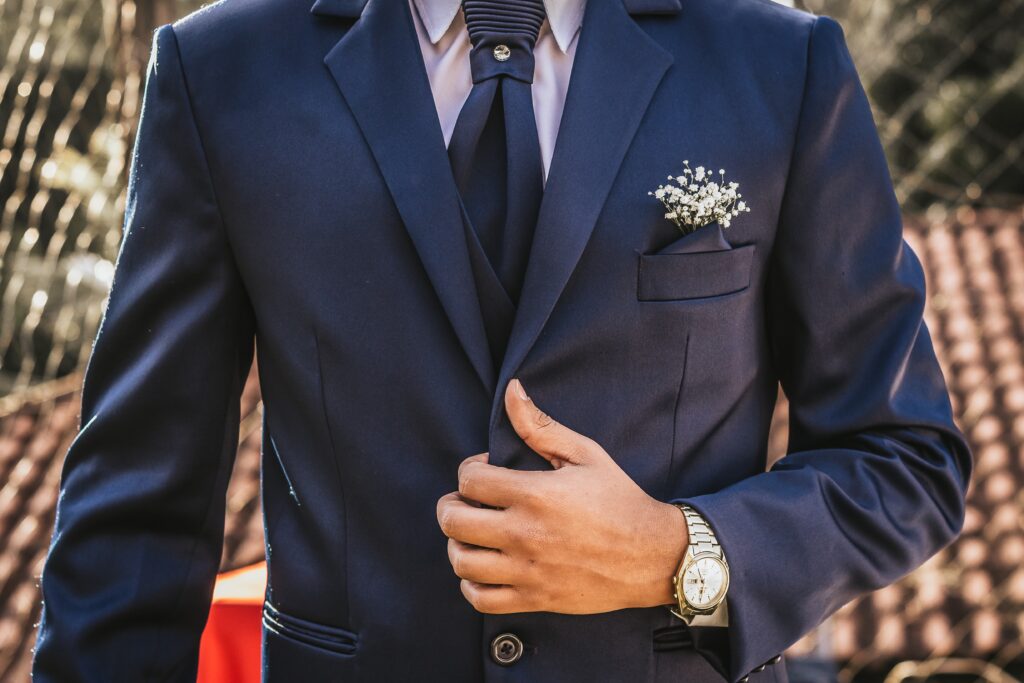
While the tips mentioned above are gender-neutral, wedding anxiety for grooms is often ignored. And even though grooms experience fewer pre-wedding jitters than the bride, on the day of the wedding, they can share the same nervousness as the bride herself. To lessen the wedding anxiety before the wedding, we’d recommend talking to your therapist or a close friend to calm down. Of course, speaking to your partner can also help at times. Your relationship is the rock and that’s why you’re taking such a huge plunge. It’s nice to remember frequently in times of distress everything that’s best in your relationship and in your partner. Talk to them about any hesitations you have regarding the wedding planning.
Though, if you have social anxiety from all the attention on the wedding day, it’s best to work on it before the big day. Gather some of your close friends and say your vows in front of them before directly saying them to your bride on the wedding day in front of everyone. Work on your self-esteem by remembering your best qualities, practicing visualizations where you see yourself confidently walking among the crowd, and gathering a supportive group of people around you. Know that it’s your big day too, and you’ve all the right to feel all the feelings you’re feeling. In the end, you will be marrying the love of your life and start this beautiful journey with her. Soak in this happiness and walk towards your wedding with only love & acceptance in your mind.
10 Wedding Anxiety Quotes To Ease Your Stress
#1 “No matter what happens, if at the end of the day you’re married to the person you love, it was a roaring success.”
#2 “I will cry at our wedding because I will be overjoyed that all the wedding planning is over.”
#3 “A wedding is a party, not a performance. If at the end of the day, you’re married to the one you love, then everything went perfectly.”
#4 “I don’t always stress about the wedding planning, but when I do it’s often at 1 AM in the morning when I have to be up at 6 for work.”
#5 “Pick out the things that are most important to you and let the rest fall into place. Enjoy every minute of planning but most importantly, the wedding itself. It goes by way too fast.”
#6 “I am a low-maintenance bride. I remind that to everyone in our daily wedding updates.”
#7 “Going on Pinterest for one idea. One hour later..and I’ve planned 5 weddings.”
#8 “Constantly stuck between “we need to save for the future” and “we get married only once.””
#9 “As long as everything goes exactly the way I want, I am totally flexible.”
#10 “Weddings are not about spending the most amount of your money or the least amount of your money. It’s about spending money and feeling good about it because you spent it on elements that matter the most to you and your partner.”
Conclusion:
Lastly, know that all anxiety, including wedding anxiety, isn’t always bad. There’s good anxiety and there’s bad anxiety. Some level of anxiety can motivate you to take action. For example, taking some stress about planning your wedding cake flavors can help you research what kinds are there, find the right baker for you, and arrange meetings with them. However, the anxiety that keeps you in worry and makes you feel helpless and worried, that’s the kind you need to manage. If your anxiety is preventing you from action, that’s when you need to take action to tame it.

